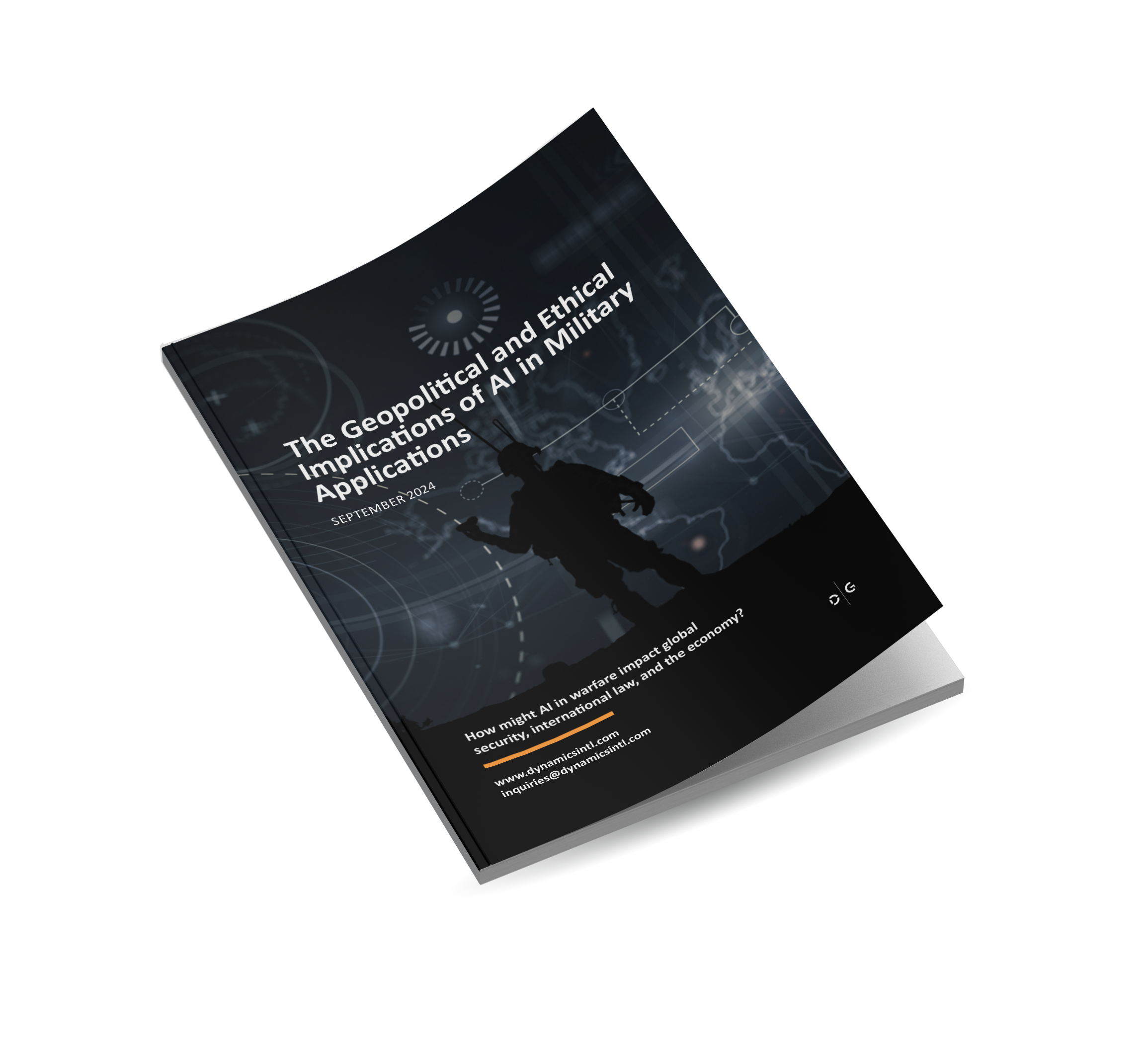Listen to the article – The Geopolitical and Ethical Implications of AI in Military Applications
As AI technologies rapidly advance, their application in conflict environments by both state and nonstate actors is expanding significantly.
From Ukraine to the Gaza Strip, militaries are leveraging AI to enhance their capabilities, from sophisticated weapons systems to advanced information warfare. Contrary to claims by some military scholars that the battle in Ukraine marks a return to conventional warfare, the use of AI in the conflict signifies a profound shift in the character of warfare.
Similarly, in Gaza, Israel’s use of AI-enabled weapons and military equipment provides a substantial advantage over its adversaries. Therefore, the integration of AI into military operations is not just an evolution but a transformative shift, carrying profound geopolitical and ethical implications.
How can we help?
Risk management
Risk management through the responsibility of taking risk ownership while ensuring safety and security
Defense and Security solutions
Our holistic business approach delivers creative solutions tailored to benefit the defense industry stakeholders.
Core observation:
- Geopolitically, the integration of AI into military operations has the potential to significantly alter the global balance of power, potentially sparking new arms races and escalating international tensions. The rapid advancement and deployment of AI-driven military technologies by major powers could destabilize regional and global security. Additionally, smaller states and non-state actors might exploit AI to gain strategic advantages, further complicating the international security landscape.
- Ethically, the use of AI in warfare raises profound questions about accountability, transparency, and the risk of unintended consequences. Autonomous systems with minimal human oversight could make life-and-death decisions, challenging existing legal and moral frameworks. The potential for civilian casualties, the erosion of human rights, and the misuse of AI in ways that violate international humanitarian law are pressing concerns that require careful consideration.
This analysis aims to explore the multifaceted geopolitical and ethical implications of AI in warfare. By examining the potential impacts on global security, international law and the economy, we seek to understand how AI might reshape the future of conflict and international relations. Through this exploration, we hope to contribute to the ongoing discourse on responsible AI adoption and the development of robust regulatory frameworks to mitigate the risks associated with its military use.
01
Erosion of Regional Stability, and Empowerment of Non-State Actors
01
Erosion of Regional Stability, and Empowerment of Non-State Actors
The military use of AI is likely to create an escalatory cycle, where states enhance their security measures, prompting others to do the same. This dynamic erodes stability in various geopolitical hotspots and sets the stage for an AI arms race. Additionally, the proliferation of military AI to non-state actors exacerbates geopolitical risks, enabling these actors to challenge the global balance of power.
Erosion of regional stability is a significant concern with the development of AI-enabled weapons systems. These advancements are likely to destabilize deterrence relations and increase the probability of a nuclear conflict.[1] Thus, these developments create a security dilemma, where one state’s efforts to enhance its security can lead to increased insecurity for others.[2] Furthermore, the current geopolitical rifts among major powers, the obscure nature of AI algorithms, and the potential for rapid technological advancements make it challenging to establish effective arms verification regimes. The difficulty of verifying AI-enabled capabilities hinders arms control efforts and contributes to a lack of trust among nuclear-armed states.[3] This distrust is likely further undermine the credibility of current arms control agreements and increase the risk of cheating or non-compliance.[4] As a result, AI-powered technologies used for military purposes will likely create a dynamics of insecurity cycle, prompting states to increase their security measures and triggering an arms race.
The arms control structure established during the First Cold War has likely deteriorated. As we enter the Fourth Industrial Revolution, marked by the rise of AI, major powers are undoubtedly seeking to use this technology to advance their national interests. Given the current geopolitical volatility, these developments introduce new challenges for international arms control regimes. As a result, the deployment of AI in military operations is likely to accelerate the AI arms race, with nations striving to maintain superiority in AI technologies for security purposes.[5] This increases the likelihood of destabilizing military engagements. Such competition will likely strain already complicated diplomatic relations, reduce trust, and trigger disputes among allies and rivals.
The accessibility of AI technology to various stakeholders empowers them to use it as a tool for challenging the global balance of power, creating a more unpredictable and potentially unstable international security environment. Thus, non-state actors leveraging accessible AI technologies, can predict military movements and disrupt societies without direct military engagement.[6] This proliferation of AI technology is likely to disrupt regional balances and complicate the cyber domain and public perception.
02
AI-Powered Cyberattacks and Manipulation of Perception
02
AI-Powered Cyberattacks and Manipulation of Perception
The use of military AI in the cyber domain has the potential to alter the geopolitical landscape. It can introduce cybersecurity attacks by adversaries and distort public perception, leading to a more volatile societal environment.
The irregular nature of cyber warfare allows state or non-state actors with advanced AI capabilities to use them as a means of warfare.[7] Such adversaries can exploit weaknesses to achieve geopolitical objectives, gather sensitive information, and manipulate policy decisions. This increases the risk of misinformation and deception likely leads to a new era of irregular warfare, with the potential to disrupt critical infrastructure and undermine international security.
Manipulating public perception through AI-driven tools, such as deepfakes and automated disinformation campaigns, can significantly distort reality and create uncertainty.[8] While the increasing use of AI by various actors presents opportunities to surpass traditional methods of countering propaganda, it also poses substantial risks. If left unchecked, AI has the potential to enable censorship, incite social discontent, and destabilize democracies. We are already witnessing the profound impact these technologies can have on public perception and political subversion.[9]
Moreover, as AI systems increasingly control the flow and analysis of information, and with the risk of losing human oversight, there is a genuine concern that this trend could lead to unanticipated consequences for international security.
Download Report
The Geopolitical and Ethical Implications of AI in Military Applications
As AI technologies rapidly advance, their application in conflict environments by both state and nonstate actors is expanding significantly.
Thus, the integration of military AI in the cyber realm introduces significant geopolitical risk, enabling adversaries to manipulate public perception and fuel social discontent. This creates an unstable socio-political and diplomatic landscape, potentially leading to expand insecurity.
03
Spiral of Escalation
03
Spiral of Escalation
Military applications of AI have the potential to undermine traditional deterrence mechanisms, likely leading to more frequent conflicts and unintended escalations. This could further deteriorate regional stability and exacerbate already heightened global tensions.
The spiral of escalation in military conflicts is significantly intensified by the integration of AI, which lowers the threshold for engagement, destabilizes strategic balances, and escalates conflicts unpredictably.[10] This raises profound security concerns, as AI-driven systems can make split-second decisions that undermine traditional deterrence mechanisms and increase the risk of hasty or preemptive actions. For instance, a stronger nation might utilize AI to strengthen its nuclear capabilities, thereby diminishing the deterrent power of a weaker nation and destabilizing the strategic balance.[11] Also, prioritization of speed over cautious deliberation by these systems in a so-called “hyper war,”[12] reduces the time available for human intervention.
Moreover, there is a risk that AI could malfunction or be exploited in a way that inadvertently escalates a crisis or conflict into a nuclear exchange.[13] This autonomy could lead to new forms of conflicts that are less predictable and more difficult to control. Therefore, integrating AI into military systems will likely complicate efforts to reduce escalation, as it could increase the likelihood of an accidental or unintended conflict. Such conflicts could further escalate to a regional conflict with a prospect of a nuclear war resulting in devastating consequences to humanity.
Building on the premise that the military use of AI has changed the character of warfare, it is evident that decisions once solely made by humans on the battlefield can now be delegated to machines.[14] This shift raises profound ethical and legal questions, particularly when AI is involved in military decision-making processes. The delegation of such critical decisions to AI systems challenges our understanding of accountability, responsibility, and the moral implications of warfare.
04
Disruption of International Legal Frameworks
04
Disruption of International Legal Frameworks
The integration of AI into military applications is likely to disrupt the foundations of international law.
Disruption of international law is evident in the absence of a specific treaty to regulate AI in warfare. Today’s unpredictable geopolitical situation indicates that the established international norms are in decline, leaving little room for international coordination in regulating these AI systems.[15] As AI’s development is characterized by several distinct features that complicate its regulation. AI technologies primarily operate discreetly, requiring minimal physical infrastructure compared to traditional military technologies, which complicates monitoring and control efforts. Additionally, AI systems are often developed in a modular fashion, with various components created independently and only revealing their full potential when integrated. This decentralization challenges the creation of comprehensive regulatory measures. Furthermore, the development of AI technology is widespread, spanning different geographical regions and jurisdictions, making international coordination and oversight more challenging.
Furthermore, the use of AI in warfare has the potential to alter state incentives and behaviors in unpredictable ways.[16] Initially, advancements in AI capabilities could exacerbate security dilemmas, leading to increased tensions between states and fostering a more adversarial international environment. Additionally, the military application of AI systems might encourage states to act unilaterally, undermining multilateral cooperation and weakening the effectiveness of international legal norms.[17] This complex environment could result in violations of international humanitarian law or the emergence of new, unregulated forms of conflict. Consequently, it may erode foundational principles and regulatory effectiveness, weaken established global governance institutions and international norms, and make diplomatic resolutions even more challenging. Namely, the declining demand and use of AI and the erosion of legal principles likely leads to economic consequences.
05
The Economic Implications
05
The Economic Implications
The use of AI in the military is likely to strain national economies, disrupt supply chains, and be used as an economic weapon.
AI is affecting virtually all sectors of the national economies. The allocation of resources for developing, deploying, and maintaining AI military technologies is in continually rising, with expenditures expected to reach USD 11 billion by 2026.[18] This trend of increasing expenditures to maintain the technological edge on AI development and deployment is likely to strain national budgets. Funding national security initiatives often diverts resources from essential public services and sustainable economic development. As a result, states could find themselves on a path leading to domestic instability and disrupted economy and energy security.[19] Therefore, the drive to stay ahead in the AI arms race suggests that more resources will be allocated to military AI technologies at the expense of pressing social issues, public services, and economic development. In this context, such policies are likely to disrupt the economy, potentially triggering domestic instability.
The supply chain is significantly impacted by the rapid integration of AI into military complexes. Stricter controls on technology transfer, data sharing, and foreign investments have been imposed, disrupting the markets. Protectionist measures aimed at safeguarding AI capabilities or restricting access to critical technologies are likely to further disrupt global supply chains.[20]
This fragmentation of the global market could have cascading effects on economies heavily integrated into global trade networks and industries reliant on international cooperation, leading to reduced economic efficiency, higher costs, and slower innovation. In other words, there is a significant likelihood of considerable economic disruptions.
How can we help?
Risk management
Risk management through the responsibility of taking risk ownership while ensuring safety and security
Defense and Security solutions
Our holistic business approach delivers creative solutions tailored to benefit the defense industry stakeholders.
As AI becomes increasingly weaponized, states leading in AI technology are resorting to economic pressure tactics, such as sanctions and restrictions on technology transfers.[21] This race to dominate AI advancements is exemplified by semiconductor-related sanctions, particularly in the context of the US-China trade war.[22] Control over advanced technologies has become a geopolitical weapon for major powers to advance their national interests, often at the expense of global economic development and strategic stability. Given the current unstable geopolitical environment and the growing rift among major powers, it is likely that the approach of coercion and sanctions will continue. This approach is expected to deepen economic divides, exacerbate existing conflicts, disrupt global supply chains and trade, and create risks to the global economy.
06
Summary
06
Summary
The integration of AI into military applications presents a complex array of geopolitical and ethical challenges that demand careful consideration and proactive management. As AI technologies continue to evolve, their impact on global security, international legal norms, and the ethical dimensions of warfare will become increasingly significant.
To overcome these challenges, it is essential for policymakers, defense industry CO’s, military leaders, and international organizations to collaborate on establishing comprehensive guidelines and regulations for the military use of AI. By fostering dialogue and cooperation, the global community can work towards mitigating the risks associated with AI in military applications while harnessing its potential to enhance security and stability.
In conclusion, the geopolitical and ethical implications of AI in military applications underscore the need for a balanced approach that prioritizes both innovation and responsibility. Through thoughtful analysis and proactive governance, we can strive to ensure that AI technologies are used in ways that promote peace, security, and respect for human rights.

ARTICLE | 19 PAGES






